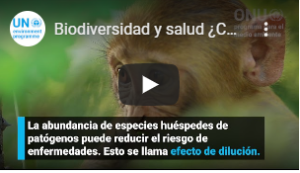5th June. World Environment Day
World Environment Day, held on June 5, it was established by the General Assembly of the United Nations in 1972 at the time of the first UN summit on the environment, the Stockholm Conference on the Human Environment.
World Environment Day urge people, communities and governments around the world to take action on the most pressing environmental challenges that our planet is facing. Therefore, each year there is a host country and a central topic, in 2020 the topic is biodiversity and the country Colombia.
This topic coincides with the Covid-19 crisis that makes us aware of the extent to which environmental degradation and the loss of terrestrial biodiversity makes us more vulnerable and threatens not only our health but also our survival as a species.
 Biodiversity is the variety of plant and animal species that live in a given space. There are currently approximately eight million species on earth, each living in a unique ecosystem. Each member of this category plays a fundamental role to get the natural balance. In this sense, it is evident that in a world where multiple living being’s existence that make up the human environment and allow subsistence is not respected, we will be condemned to poverty and inequality, understanding that biodiversity is the basis of all life in the earth, and without it, human health is compromised. The loss of biodiversity can have serious consequences for humanity if there is no real awareness of its implications.
Biodiversity is the variety of plant and animal species that live in a given space. There are currently approximately eight million species on earth, each living in a unique ecosystem. Each member of this category plays a fundamental role to get the natural balance. In this sense, it is evident that in a world where multiple living being’s existence that make up the human environment and allow subsistence is not respected, we will be condemned to poverty and inequality, understanding that biodiversity is the basis of all life in the earth, and without it, human health is compromised. The loss of biodiversity can have serious consequences for humanity if there is no real awareness of its implications.
In this order, the philosopher Enrique Dussel (2020) reflects and give us an example with an interesting metaphor:
“Chess in a game in which at some final moment a Pawn can say ‘Check to the king’ and if the king does not know how to move he becomes a ‘Checkmate’. We are facing a moment when Nature has said ‘Check’ to Modernity and it will have to respond. It is possible that it wants to respond by escaping in some secondary way, but it will return until it is ‘Checkmate’ if the whole game is not solved again and from the beginning “(Full interview: link)
Without a doubt, Education for Social and Environmental Justice play a fundamental role in this urgent social change. It is essential, that as Gadotti (2005) points out, that education involves an educational philosophy focused on both the local and the global.
